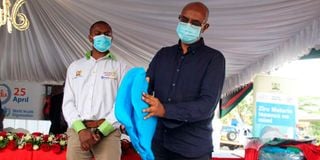Kenya registers drop in malaria cases

Health Chief Administrative Secretary Dr Rashid Aman (right) displays a mosquito net at Afya House, Nairobi, on April 25, 2021. Looking on is National Malaria Programme Director George Githuka.
Kenya has made strides in combating malaria with statistics showing a 25 percent reduction of the disease in the country.
According to the Kenya Malaria Indicator Survey 2020, malaria cases fell nationally from a prevalence of eight percent in 2015 to 5.6 percent in 2020.
The data from the survey shows that malaria cases reduced from 113 per 1000 people to 86 cases per 1000 people.
Cases in the malaria endemic zones of the Lake Region fell from a prevalence of 27 percent to 19 percent and from eight percent to 4.5 percent currently at the Coast- almost 50 per cent reduction.
While commemorating the World Malaria Day on Sunday, Health Chief Administrative Secretary Dr Rashid Aman said despite Africa missing its 2020 target of reducing malaria and mortality by 40 per cent, Kenya had started making commendable progress.
“We also seem not to be on track in the continent to eliminate malaria by 2030, but efforts by the malaria control programme in Kenya are beginning to bear fruits,” he said.
Mosquito nets
According to the Kenya Malaria Indicator Survey report, the gains have been made due to increased use of mosquito nets by communities between 2015 and 2020. There was also improved access to recommended malaria treatment.
“The proportion of patients with malaria seeking outpatient services reduced from 30 per cent to 19 percent while the inpatient admissions decreased from 20 percent to 15 per cent,” said Dr Aman.
In an effort to further control malaria, the Ministry of Health has launched a campaign to distribute 15.7 million insecticide treated mosquito nets in 27 high malaria burden counties from April 30 to July 31, 2021. The Ministry of Health says the Sh8 billion campaign targets 25 million Kenyans.
“We plan to scale up our current efforts, introduce new strategies and draw lessons from countries that have recently eliminated malaria like Cuba, Argentina and Algeria,” said Dr Aman.
In 2019, Kenya signed an agreement with Cuba to undertake a two-year project on the use of biological methods to control mosquito vectors, by targeting mosquito breeding sites.
Breeding sites
The malaria vector-control project targets eight malaria endemic counties like Kisumu, Siaya, Migori, Homa Bay, Busia, Bungoma, Kakamega and Vihiga.
“Experts from Cuba arrived in the country this week and they will be working with their Kenyan counterparts in the national and county levels to map out key breeding sites for spraying using the biological methods to kill mosquito larvae at the breeding sites,” said the Health CAS.
Currently, it is only Kenya, Ghana and Malawi on the African continent that have deployed the first ever malaria vaccine, he said adding that more than 190,000 children in selected areas of the country have received at least one dose of the vaccine since 2019.
But Kenya needs Sh24 billion to fully implement the current Kenya Malaria Strategic Plan from 2018 to 2023, to succeed in eradicating the disease.
According to the World Health Organisation, there were 229 million cases of malaria and 409 deaths globally in 2019.





